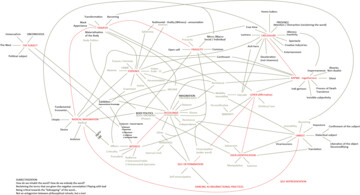‘kapwa’ is an indigenous Filipino (Tagalog) term of psychology whose root is anchored in pre-hispanic, pre-colonial thinking, a cultural ethnic attitude of ‘the self in the other’. This is a relational attitude between generations where each individual acknowledges their relevance and responsibility to carry forward their ancestral collective significance, in particular respect to their local community and natural environment. The ‘self’ is an integral part of the ‘other’ and intertwined, thus an action outside of the self is innately an action within. Such an attitude can be found across the diaspora of Asian psychologies, most coherently phrased by renown Vietnamese Buddhist Thich Nhat Hanh ‘There is the collective consciousness and the individual consciousness. Our individual consciousness is made of our collective consciousness, and our collective consciousness is made of our individual consciousness. We reflect everything. And everything reflects us. And the process begins with yourself.’
In short, the ‘kapwa’ of an individual is firstly determined by the alignment of the universe upon our birth; secondly by the spirit of our times and thirdly and most critically, by the nurturing qualities of our local (eg. family, community). I am struck by artists who, perhaps subconsciously, refer to the interconnectedness of ‘kapwa’, perhaps framed between what is institutionalized and what is intuitively experienced – be it through the documentary retelling of religious discrimination in South Korea through shamanistic texts (Park Chan Kyong, South Korea); the willful investment of ‘belief’ in informal collectivized faith in the healing within the supernatural (Truong Cong Tung, Vietnam); most tellingly ‘kapwa’ is encompassed in the filmic works of Filipino artist Kidlat Tahimik, a member of the ‘Third Cinema’ Movement. His life’s work is committed to an awareness of how his moving image novellas, that span a 35 year period of production, present his ‘self’ anchored in the local traditions of time, while simultaneously enduring colonial and capitalist dictations of class and representations of self-hood (ie. Economy). His filmic collages in essay form stunningly illustrate the resistance to, and embracement of, the flow of the dollar as a symbol of progress but at a great significant sacrifice of one’s ‘kapwa’ (see ‘Yellow’ and ‘Memories of Overdevelopment’ particularly).




